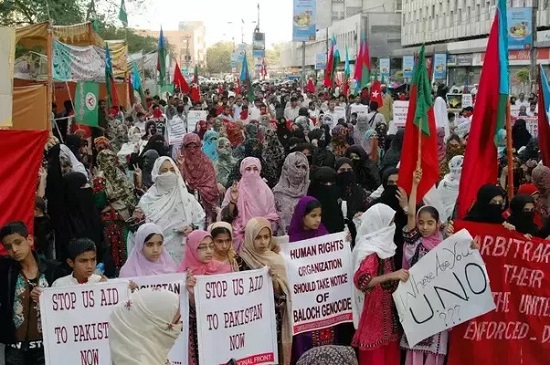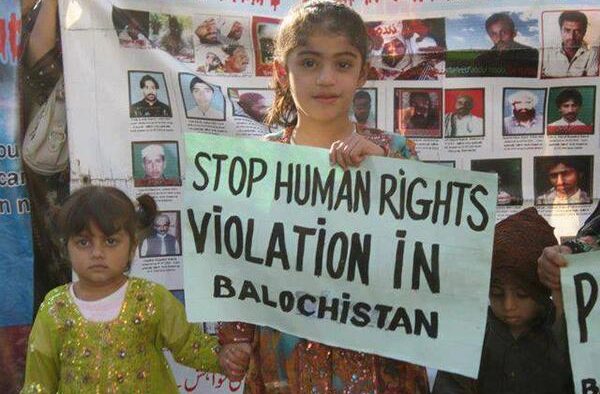On December 9, Pakistani security forces set free four Balochi women whom they had picked up from their homes in Awaran district on November 30. But the real reason behind this release wasn’t compassion or magnanimity by the government of Pakistan on the eve of International Human Rights Day 2019. It was only because Sardar Akhtar Mengal, the chief of Balochistan National Party (Mengal) that is a coalition partner of the ruling Pakistan Tehreek-e-Insaf party, had personally intervened and sent out an unambiguous warning that “We do not see the point of being a partner of this government if it refuses to address our genuine concerns.”
These four women were indeed very lucky because Balochistan is infamous for what Unrepresented Nations & Peoples Organisation (UNPO) refers to Pakistan’s “kill and dump” policy and this traumatising phrase is no exaggeration. Human Rights Commission of Pakistan (HRCP)-2013 report states that there are “credible reports of continued serious human rights violations, including (enforced) disappearances of people, arbitrary arrests, torture and extrajudicial killings.” The same things are echoed in Human Rights Watch (HRW) World Report 2019 on Pakistan, which observes that “During counter-terrorism operations, Pakistani security forces often are responsible for serious human rights violations including torture, enforced disappearances, detention without charge, and extrajudicial killings, according to Pakistan human rights defenders and defense lawyers.”
Unfortunately, human rights violations by Pakistani security forces and law enforcement agencies operating in Balochistan are neither rare aberrations nor restricted to lower echelons within the establishment. Au contraire, the 2019 HRW report notes that “counter-terrorism laws also continue to be misused as an instrument of political coercion. Authorities do not allow independent monitoring of trials in military courts and many defendants are denied the right to a fair trial.” The report presents a harrowing picture by stating that “…From the public point of view, enforced disappearances is still the biggest issue in Balochistan. Incidents of disappearance continue unabated and, in most cases, victims’ families are afraid of communicating their cases to the authorities. The fact that Dr Abdul Malik Baloch who was the Chief Minister of Balochistan from 2013 to 2015 has gone on record to say that “When the army is attacked, it will hit back,” just goes to prove how formidable and vengeful Pakistan’s deep state is!
Another insight into how well entrenched and institutionalised human rights violations are in Balochistan can be gauged from HRW’s Pakistan report 2011. In it there is a mention of 76 year old Secretary General of the Baloch Republican Party Bashir Azeem who during his “unacknowledged detention” was told by a Pakistani official that, “Even if the President or Chief Justice tells us to release you, we won’t. We can torture you, or kill you, or keep you for years at our will. It is only the Army Chief and the (ISI) Chief that we obey!” This report also notes that “These (enforced) disappearances take place in a province in which armed militants, particularly Baloch nationalist armed groups, have attacked security forces and military bases throughout the province” and this makes it evident that Pakistan Army is using the strategy of ‘enforced disappearances’ both to deter attacks and as an institutionalised form of vendetta!

One of the most disturbing instances of ‘enforced disappearance’ came to light in January 2014 when a shepherd stumbled upon a mass grave in Totak area of Khuzdar district in Balochistan, which according to media reports contained about 100 dead bodies. The judicial inquiry that probed this case not only gave the Pakistan Army and intelligence agencies a clean chit but also failed to identify the killers. The pathetic part is that instead of displaying investigative and deductive skills, the judicial inquiry admitted that it had arrived at its conclusion just because “No one has recorded any statement against the armed forces and security agencies.” No wonder Human Rights Commission of Pakistan (HRCP) Chairperson Ms. Zohra Yusuf told reporters that “The government has also not allowed the HRCP mission to visit the site, despite several written and verbal requests” and attacked the government by calling this “just another” judicial report. Eight years have gone by, but the perpetrators who murdered the Balochis whose remains were found in the mass grave have not yet been identified and the reason is not hard to guess!
A report published by BBC News in 2016 contains shocking data of ‘kill and dump’ incidents. A few of these are:
- Pakistan’s Federal Ministry of Human Rights has confirmed that at least 936 dead bodies have been found in Balochistan since 2011.
- The Voice for Baloch Missing Persons (VBMP) has recorded 1,200 cases of “dumped bodies,” but this list is not exhaustive as it does not include people who have been victims of ‘enforced disappearances” and whose remains haven’t yet been found.
- A political activist named Jalil Reki, who lived in the Saryab neighbourhood of Quetta was arrested from his residence in 2009. No one knew where he was taken but two years later, his bullet ridden body with fractured arms and cigarette burns on his back were found in Mand area (near the Iranian border) which is at a distance of more than 1000 km from Quetta (from where he was arrested)!
Balochistan has been bleeding continuously for the last seven decades but the world doesn’t seem to have either the time or inclination to do something to ameliorate the sufferings of its oppressed people who are hapless victims of state-sponsored terrorism. By resorting to aerial bombardment of Balochi settlements, the Pakistan Army has declared an all-out war against its own people while its complicity in orchestrating ‘enforced disappearances’ and active pursuance of the ‘kill and dump’ policy is in gross violation of human rights and international law.
The mission statement of the Office of the United Nations High Commissioner for Human Rights (OHCHR) is “to work for the protection of all human rights for all people” and while doing so, “give priority to addressing the most pressing human rights violations, both acute and chronic, particularly those that put life in imminent peril.” So, any further inaction on the part of the international community in forcing Pakistan Army to end atrocities on innocent civilians in Balochistan will only make the OHCHR defunct! The whole world accepts that instances of ‘enforced disappearances’ as well as ‘kill and dump’ cases are common place in Balochistan, but yet, these unspeakable atrocities have failed to stir the collective conscience of the international community and this is shameful.
How many more people must die in Balochistan before the OHCHR wakes up to this humungous human tragedy?
Postscript- In his tweet to the ‘umma’ (entire Muslim community), Prime Minister Imran Khan wrote “On international Human Rights Day, Muslims need to remember that the message of equality, justice & protection of human rights for all was given more than 1,400 years ago by our Prophet (PBUH).” Whereas this reminder is a very noble gesture, but the question everyone would like to ask PM Imran Khan is, “In Balochistan, when will the Pakistan Army start following the message of justice and protection of human rights given by the Prophet (PBUH)?

